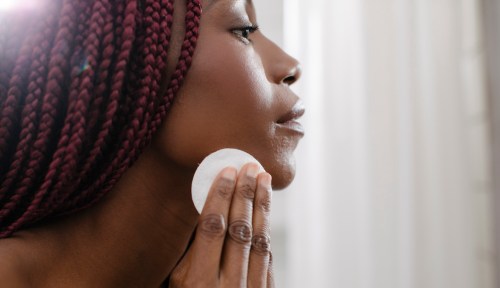Here’s Everything Derms Want You To Know When You See Yeast on a Skin-Care Label
Yeast in skin-care products can help hydrate your skin, improve your complexion, and protect your skin from pollution and UV damage.

We’re paying more attention than ever to what’s going in—and on—our bodies and that includes a heavy ingredient focus in the world of skin care. Terms like hyaluronic acid, retinaldehyde, and niacinamide may sound like they came from a chemistry textbook, but they’re mainstays in a skin-care lover’s vernacular.
Experts in This Article
board-certified dermatologist and founder of Tone Dermatology
Maegan Griffin, MSN, NP-C, founder of Skin Pharm, a cosmetic dermatology clinic and skin-care line.
celebrity esthetician and owner of Sarah Akram Skincare
board-certified internal medicine physician and the founder of skincare line Sunsimaya
While looking into ingredients, some may be surprised to find a common pantry item on that list of compounds and chemicals: yeast. If you’re thinking “why is there yeast in my skin-care product?” then read on, and allow the pros to explain the benefits.
Benefits of yeast in your skin care
TL;DR: Yeast can be a highly beneficial ingredient (all the experts agree!).
“Through research, we have found that yeast extract is most commonly used because it reduces the amount of oxidative stress on the skin, has a calming effect that helps soothe skin, and can help improve overall skin hydration,” says Maegan Griffin, MSN, NP-C, a nurse practitioner and the founder of Skin Pharm, a cosmetic dermatology clinic and skin-care line. And it can help brighten your overall complexion, she adds.
Sunitha Posina, MD, a board-certified internist from New York City corroborates this. “Due to its antioxidant property, it helps fight free radicals from pollution and UV rays and, as a result, helps with anti-aging, sun damage, and pigmentation,” she says, explaining that the antioxidant properties are due to yeast being a beta-glucan. “In addition to being rich in vitamins (especially vitamin B), amino acids, and minerals, a study in Dermatologic Therapy also showed that yeast extract can help with collagen synthesis,” says Posina.
In fact, the beta-glucans are also a skin humectant—meaning it can help the skin retain moisture—explains Caroline Robinson, MD, a board-certified medical and cosmetic dermatologist in Chicago and founder of Tone Dermatology. Additionally, yeast extract could make the rest of the ingredients in your skin-care products more effective. “Yeast in skin care is often used for the purpose of releasing active ingredients—such as amino acids and peptides—or making certain active ingredients more concentrated and therefore more potent,” she says.
What’s even more promising is that yeast is an FDA-approved ingredient. Yeast extract and beta-glucans—which Griffin uses in the formulation of her own products—are the sugars found in the cell walls of bacteria, fungi, yeasts, algae, lichens, and plants like oats and barley, says Dr. Robinson, and “are deemed safe and effective by the FDA.”
This Parisian Skincare Brand Is Launching in the United States for the First Time—Here’s What a Derm Wants You to Know

We’re Calling It: Cleansing Balms Are the Face Wash of the Future—Here Are 3 to Add to Your Cart

This Is the One Product That Scarlett Johansson Always Keeps in Her Purse and on Her Bedside Table

Can yeast in skin care ever be harmful?
The experts don’t seem to think yeast in skin-care products is harmful—unless you have a very specific, uncommon situation with yeast already. “The only reason yeast in skin-care products can be harmful is if the individual using it already has an imbalance of yeast present,” says Sarah Akram, celebrity board-licensed esthetician and founder of Sarah Akram Skincare. “In this case, using skin-care products containing yeast may cause an infection.”
Dr. Posina agrees, explaining that a reaction would be rare. “There is no reason [to] avoid yeast unless you are allergic to it,” she says. “Given its benefits and the rare adverse effects, I don’t see why one should avoid it. If the products are well-made, stabilized, and balanced, it is not known to have harmful effects.”
“When yeast is formulated with or into skin care, it is not harmful to the skin; however I advise against mixing yeast into skin care on your own,” says Dr. Robinson.
Debunking myths about yeast and acne
There are some inaccuracies floating around concerning yeast and fungal acne. Griffin says this is all myth. “Fungal acne is most often caused by heat and humidity, overuse of antibiotics, sweat, and/or contact with others, and not by yeast extract or ingredients derived by yeast found in your skin-care’s ingredient lists,” she says.
Do you need yeast in your skin-care routine?
You don’t necessarily need yeast in your skin-care routine to achieve your skin goals, though it certainly can be a beneficial ingredient. “Yeast fermented products and products formulated with these extracts are not an essential part of a skin-care routine,” says Dr. Robinson. Her advice? Keep things as simple as possible. “I encourage patients to start with basic skin care: sunscreen, topical antioxidants, and topical retinol before adding more specialized or advanced skin-care products.”
Build a great skin-care routine with this dermatologist’s tips:
Want even more beauty intel from our editors? Join Well+Good’s Fine Print Facebook group (and follow us on Instagram) for must-know tips and tricks.
Sign Up for Our Daily Newsletter
Get all the latest in wellness, trends, food, fitness, beauty, and more delivered right to your inbox.
Got it, you've been added to our email list.







